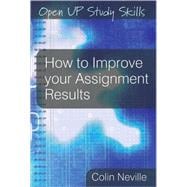
| Acknowledgements | p. viii |
| Why read this book | p. 1 |
| Flight | p. 2 |
| Fright | p. 2 |
| Fight | p. 2 |
| What this book covers | p. 3 |
| What to expect in each chapter | p. 3 |
| The shock of poor results | p. 6 |
| Impact | p. 7 |
| Moving on | p. 9 |
| Self-analysis | p. 9 |
| Interpreting your assignment results | p. 12 |
| Essays and reports | p. 12 |
| What the marks from your tutors 'mean' | p. 15 |
| What tutors expect of you | p. 20 |
| 'You have not answered or addressed the question' | p. 24 |
| Key words, propositions, and assumptions | p. 25 |
| Spot the proposition | p. 29 |
| Do you agree with the proposition? | p. 30 |
| What else? | p. 30 |
| The importance of good introductions | p. 31 |
| Keep focused on the assignment topic | p. 33 |
| 'Your work is more descriptive than critical' | p. 36 |
| Critical thinking/critical analysis | p. 37 |
| Six ways to be analytical | p. 38 |
| Getting started | p. 39 |
| Analysing theories | p. 41 |
| Six ways to question a theory (or idea, model, or practice) | p. 42 |
| The Janus face of arguments | p. 44 |
| Identifying flaws in arguments | p. 44 |
| Constructing your own arguments | p. 46 |
| 'Your assignment was poorly structured' | p. 48 |
| Essays | p. 49 |
| Introductions | p. 55 |
| Conclusions | p. 57 |
| Report Structure | p. 63 |
| 'You did not tell me anything new' | p. 73 |
| Become an ideas entrepreneur | p. 74 |
| The role of a student | p. 74 |
| What is creativity? | p. 76 |
| Looking good | p. 80 |
| 'Your reading for this assignment is limited' | p. 85 |
| Which sources to use | p. 86 |
| Weaker sources? | p. 88 |
| Other sources | p. 90 |
| How can you discriminate and choose between sources? | p. 92 |
| 'You need to improve your referencing' | p. 95 |
| Using evidence in assignments | p. 95 |
| Why reference? | p. 97 |
| When to reference | p. 98 |
| When you don't need to reference | p. 99 |
| Avoiding plagiarism | p. 99 |
| How to reference | p. 102 |
| What's the difference between references and a bibliography? | p. 105 |
| 'Your English is weak: it was difficult to follow your arguments' | p. 110 |
| The price of mistakes | p. 111 |
| Comma confusion | p. 112 |
| Correct use of the apostrophe | p. 113 |
| Common errors | p. 114 |
| Spelling | p. 115 |
| Keep it short | p. 116 |
| The importance of redrafting and proofreading | p. 121 |
| Recommended reading | p. 122 |
| Finding your own voice in assignments | p. 123 |
| Example essay | p. 124 |
| Commentary | p. 130 |
| Developing your own writing style | p. 133 |
| You and 'I' | p. 137 |
| Sources of help | p. 140 |
| Support from tutors | p. 141 |
| Support from other students | p. 143 |
| Counselling services | p. 145 |
| Learning support centres | p. 145 |
| The LearnHigher network | p. 146 |
| The 'Write-Now' Centre of Excellence in Teaching and Learning (CETL) | p. 147 |
| The Student Network CETL | p. 147 |
| The best support is you | p. 147 |
| Suggested additional reading | p. 150 |
| p. 151 | |
| p. 153 | |
| p. 156 | |
| p. 157 | |
| p. 158 | |
| p. 159 | |
| p. 163 | |
| References | p. 166 |
| Index | p. 169 |
| Table of Contents provided by Ingram. All Rights Reserved. |
The New copy of this book will include any supplemental materials advertised. Please check the title of the book to determine if it should include any access cards, study guides, lab manuals, CDs, etc.
The Used, Rental and eBook copies of this book are not guaranteed to include any supplemental materials. Typically, only the book itself is included. This is true even if the title states it includes any access cards, study guides, lab manuals, CDs, etc.